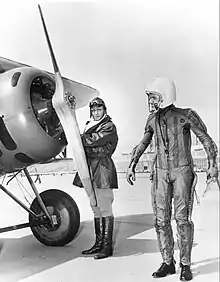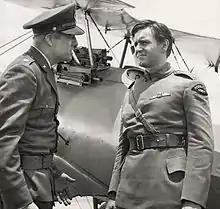The Last Flight (The Twilight Zone)
"The Last Flight" is episode 18 of the American television anthology series The Twilight Zone. Part of the production was filmed on location at Norton Air Force Base in San Bernardino, California. The vintage 1918 Nieuport 28 biplane was both owned and flown by Frank Gifford Tallman, and had previously appeared in many World War I motion pictures.
| "The Last Flight" | |
|---|---|
| The Twilight Zone episode | |
 Publicity shot from "The Last Flight" | |
| Episode no. | Season 1 Episode 18 |
| Directed by | William F. Claxton |
| Written by | Richard Matheson |
| Based on | "Flight" by Richard Matheson |
| Featured music | Stock from "Where Is Everybody?" by Bernard Herrmann |
| Production code | 173-3607 |
| Original air date | February 5, 1960 |
| Guest appearances | |
| |
Cast
Kenneth Haigh as Lt. William Terrance ‘Terry’ Decker
Alexander Scourby as Maj. Gen. George Harper
Simon Scott as Maj. Wilson
Robert Warwick as A.V.M Alexander ‘Leadbottom’ Mackaye, R.A.F
Rod Serling as Narrator (uncredited)
Harry Raybould plays an unnamed Corporal, Jerry Catron plays an unnamed guard, Paul Baxley plays an unnamed driver (uncredited), and Jack Perkins plays an unnamed ground crewman (uncredited).[1]
Opening narration
Witness Flight Lieutenant William Terrance Decker, Royal Flying Corps, returning from a patrol somewhere over France. The year is 1917. The problem is that the lieutenant is hopelessly lost. Lieutenant Decker will soon discover that a man can be lost not only in terms of maps and miles, but also in time—and time in this case can be measured in eternities.
Plot
Flight Lieutenant William Terrance "Terry" Decker of 56 Squadron Royal Flying Corps lands his Nieuport biplane on an American airbase in France, after flying through a strange cloud. He is immediately accosted by provost marshal Major Wilson, who is dumbfounded by Decker's archaic appearance. Decker, likewise, is baffled, but by the unexplainable large modern aircraft. He is then taken into custody and questioned by the American base commander, Major General George Harper, and by Wilson. Decker snaps to attention, identifying himself as being from the UK's Royal Flying Corps (the predecessor of the modern Royal Air Force). This only puzzles Harper and Wilson who can't explain his antiquated looks. Decker asks where he is claiming that he thought he was "landing at 56th Squadron RFC". When asked to identify the year, Decker answers that it's 1917. When they inform him it's March 5, 1959, he is stunned.
Decker tells the officers his flying partner Alexander Mackaye and he were fighting seven German aircraft; Mackaye was shot down and Decker escaped into a cloud. The Americans, to Decker's astonishment, inform him Mackaye is alive and is an air vice marshal in the Royal Air Force, a war hero from World War II who saved hundreds, if not thousands of lives by shooting down German bombers over London. The American officers add that Air Vice Marshal Mackaye, in addition to being alive and well, is coming to the base that very day for an inspection. Decker says that is impossible, as Mackaye is dead. Harper, at this time, confiscates Decker's pistol and personal effects. Later, Major Wilson tries to help Decker remember what happened. Decker finally confesses that he has consistently avoided combat throughout his service, and that he deliberately abandoned the greatly outnumbered Mackaye when the two were attacked by the German fighters. He refuses to believe that Mackaye somehow survived against such odds.
When Wilson suggests that someone else helped Mackaye, Decker realizes that he has been given a second chance. He tells the American officer that no one was within 50 miles who could have come to Mackaye's aid, so if Mackaye survived, it had to be because Decker went back himself. Knowing he cannot have much time to go back to 1917, Decker pleads with Wilson to release him from custody. When Wilson refuses, Decker assaults him and a guard and hurriedly escapes (without his badge and personal items). Running outside, he locates his plane, punches a mechanic who tries to get in his way, and starts the plane's engine. He is about to take off when Wilson catches up and puts a pistol to his head. Decker tells Wilson he will have to shoot him to stop him. After hesitating, Wilson allows him to escape and Decker flies his plane into white clouds and vanishes.
Wilson is rebuked by Harper for believing such a fantastic story and for allowing "that madman" to escape. When Mackaye later arrives, Wilson asks him about Decker to which he replies "Oh I certainly should know him—he saved my life." Mackaye proceeds to recount how Decker and he were attacked by seven German aircraft while out on patrol. Decker, in his fit of cowardice, flew away, disappearing in a cloud, with Mackaye thinking at first that Decker had abandoned him. Suddenly, Decker came diving out of the cloud with his aircraft guns blazing, and proceeded to shoot down three of the German planes before being shot down himself. With Decker's unbelievable story now corroborated by Mackaye, General Harper proceeds to show him the confiscated identification photo card and other personal effects of his young friend Decker. This leaves Mackaye bewildered and at a loss for words except for asking Wilson "What did you call me?", in response to his old personal nickname "Old Leadbottom".
Closing narration
Dialog from a play, Hamlet to Horatio: There are more things in heaven and earth than are dreamt of in your philosophy. Dialog from a play written long before men took to the sky: There are more things in heaven and earth and in the sky than perhaps can be dreamt of. And somewhere in between heaven, the sky, and the earth, lies the Twilight Zone.
Episode notes
This was the first episode of The Twilight Zone scripted by Richard Matheson. Rod Serling had previously adapted the episodes "And When the Sky Was Opened" and "Third from the Sun" from short stories of Matheson's.
Radio historian Martin Grams Jr. noted the similarities between this episode and a 1948 episode of the acclaimed radio drama series Quiet, Please called "One for the Book". According to Grams' book The Twilight Zone: Unlocking the Door to a Television Classic, Serling himself was so concerned about the similarities that he attempted to buy the rights to the Quiet, Please episode to avoid any potential copyright infringement.
Further reading
References
- "The Twilight Zone" The Last Flight (TV Episode 1960) - IMDb, retrieved 2023-05-28
